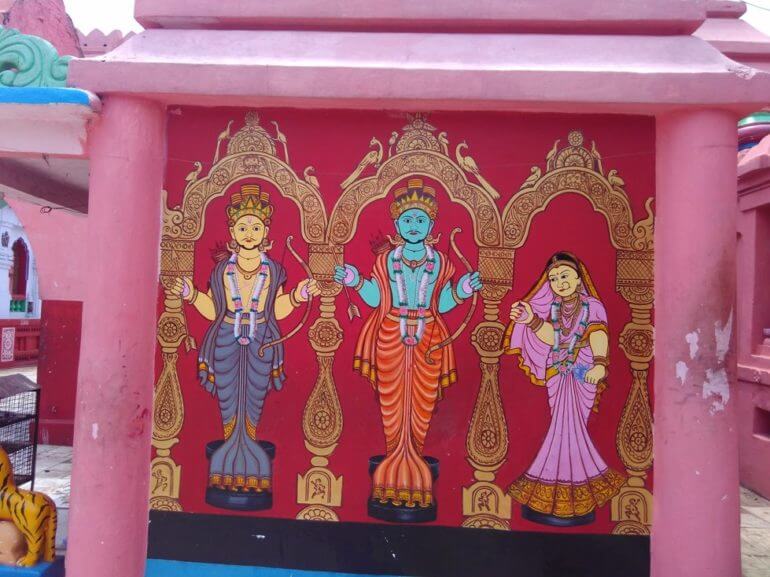
Is There a Connection between Jews and Hindus?
Dear Jew in the City,
Recently, you referenced a relationship between Jews and Hindus. Can you please expand on that?
Sincerely,
Rebecca
Dear Rebecca,
Thanks for your question. That was in the article on Jewish-Muslim relations. What I wrote there was, “Avraham had other children, with his second wife, Keturah (who may or may not have been Hagar). He sent them away to the East, and there are those who believe their descendants are the Hindus.”
I’m happy to give you some details, but with a big caveat: while some may believe this assertion, I don’t think it reflects history, and it certainly has no impact on theology. In my opinion, it’s just an interesting series of coincidences.
The theory hinges on identifying Avraham (Abraham) with Brahma, a Hindu deity. For starters, there’s an obvious similarity between their names, but it goes much deeper than that. For example, in Genesis 17:5, Avraham is told that he will become the father of a multitude of nations. Brahma, the Hindu creator god, is referred to as the father of all. (The source for this is Rigveda, mandala 7, but you know what? I’m not going to cite all the Hindu sources. I usually look up all the sources I cite, but here I’m just going to rely on secondary sources.) One might consider Avraham to be the father of all of them if they’re his descendants through Keturah. Why might Avraham come to have been identified with the creator deity? Well, Who was it that Avraham was renowned for teaching people about? This could be a case of later generations confusing the messenger with the message.
Avraham’s wife was Sarah, who was also his sister (Genesis 20:12; more specifically, she was a half-sister, a relationship that was permitted before the Torah was given). She is described by the Torah as being very beautiful (Genesis 12:14). Sarah had a servant – i.e., a subordinate – named Hagar.
Brahma’s wife was Sarasvati (or Saraswati), who was also his sister. She is described by the Atharvaveda as being very beautiful. The River Sarasvati, named for the goddess, has a tributary – i.e., a subordinate branch – named Ghaggar.
Avraham was 100 years old (and Sarah was 90) when they had Yitzchak (Genesis 21.5); Brahma and Sarasvati were together for 100 years before they had their first son.
Avraham was commanded to bind his son Yitzchak as an offering to God. Yitzchak was spared and a ram ended up being offered in his place (Genesis 22). Brahma’s son Daksha was killed as an offering to the gods. Brahma pleaded and Shiva revived Daksha, with the head of a ram.
There are other similarities between the two faiths. For example, in the Torah, the first couple was Adam and Chava (Eve). Counter to God’s instruction, Chava ate the fruit of the Tree of Knowledge, subsequently giving some to Adam. The Rigveda tells the story of two birds named Atman and Jiva. Jiva temporarily forgets the creator and eats the fruit of the tree, while Atman doesn’t.
Similarly, the Torah tells us about Noah, whom God warned of an impending flood and instructed to build a boat. God saved Noah, his wife, their three sons and the sons’ wives (eight people total) from the flood, after which Noah offered sacrifices and they repopulated the world. Meanwhile, the Shatapatha Brahmana speaks of Manu, whom Vishnu warned of an impending flood and instructed to build a boat. Vishnu saved Manu and seven sages (eight people total) from the flood, after which Manu offered a sacrifice and they repopulated the world.
So, might these similar stories be based on history that Avraham taught to his children from Keturah? As mentioned, I don’t believe this theory, but I must concede that there’s some remarkable circumstantial evidence.
We’re not the only ones to notice similarities. Clearchus of Soli, a disciple of Aristotle, thought that the Jews were an offshoot of the Indian philosophers. (This opinion is cited in Josephus.) The Greek explorer Megasthenes noted similarities between the Jews and the people of India, concluding that the Jews were an Indian sect called Kalani.
I haven’t seen any Torah sources particularly concerned one way or the other with whether the Hindus might be our long-lost cousins. They seem more concerned with the nature of the “gifts” that Avraham gave the children of Keturah. According to Genesis 25:5-6, Avraham made Yitzchak his sole heir; he gave gifts to his children from Keturah and sent them to the East. The gemara in Sanhedrin 91a explains this to mean that he taught these children the spiritual names of impurity. The commentators all wonder: What the heck kind of a gift is that supposed to be?
A majority of commentators (Daas Z’keinim, Chizkuni, HaKsav V’Hakabbalah, Gur Aryeh, et al.) seem to offer similar explanations. The details may differ from one to the next but what they generally boil down to is that Avraham gave them the means to protect themselves from the names of impurity, so as not to be harmed by them. Rav Hirsch, however, says that Avraham tried to teach them his traditional form of spirituality, but it became modified in transmission like a game of “broken telephone.”
Whether or not the Hindus are also descended from Avraham makes no difference. All mankind is descended from Noah. And the Mishna in Sanhedrin (4:5) teaches that God created all of humanity from one person (Adam) so that no one should be able to claim superior lineage. Furthermore, in Bereishis Rabbah (24:7), there’s a debate over the most important verse in the Torah. Rabbi Akiva suggests Leviticus 19:18 – “Love your neighbor as yourself.” However, he is topped by Ben Azzai, who says that the most important verse is Genesis 5:1 – “This is the book of the generations of Adam: on the day that God created man, He made him in His Image.”
Why is that verse more important? Because Rabbi Akiva’s verse just tells us to love our neighbors, and each person might have a different idea of who his neighbor is: just co-religionists, just people of the same nationality, just people of the same race, etc. Ben Azzai’s verse reminds us that we’re all descended from the same ancestor and each of us is created in God’s image.
A possible connection between Jews and Hindus is an interesting topic for research and speculation. Real-life relations between us and others, however, should always be dictated by proper respect for anyone created in God’s image, ancestry notwithstanding.
Sincerely,
Rabbi Jack Abramowitz
Educational Correspondent
Follow Ask Rabbi Jack on YouTube
If you found this content meaningful and want to help further our mission through our Keter, Makom, and Tikun branches, please consider becoming a Change Maker today.








1 comment
Sort by
Suggest you look into ancient Jewish travellers to India.